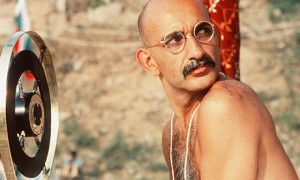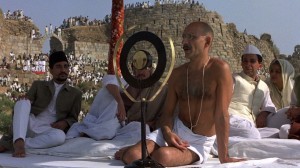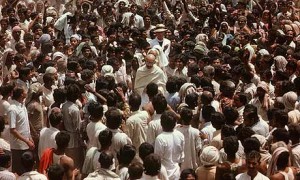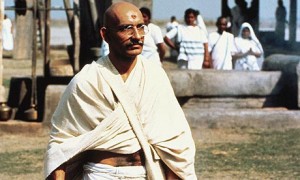One of the most overrated pictures of the 1980s, Richard Attenborough’s conventional bio-picture Gandhi. proved that subject matter is more important than artistic vision or visual style.
Elevated by a quietly intelligent performance by Ben Kingsley in the lead role, Gandhi includes some powerful scenes in what’s a largely disappointing and routine biopic.
The director’s intent to illuminate the venerable leader’s singular personality and the rather complex socio-historical contexts in which he lived is only sporadically fulfilled.
Kingsley, then better-known as a stage actor (Royal Shakespeare Company) is always riveting to watch, rendering a witty and resourceful performance that, physically at least, benefits from his being part Indian; he was born Krishna Banji.
Our grade: B (***1/2* out of *****)
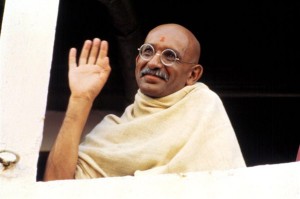 Attenborough aims at presenting a portrait of an extraordinarily complex man who changed history, though not quite as radically as he had hoped.
Attenborough aims at presenting a portrait of an extraordinarily complex man who changed history, though not quite as radically as he had hoped.
“Gandhi” is produced on an ambitiously panoramic scale, attempting to imitate David Lean’s films, specifically Lawrence of Arabia, but without Lean’s unified vision or imagination.
A chronicle of major historical events, people, and dates, “Gandhi” illustrates history in the manner of a well-researched textbook that means exactly what it says–its sincerity is uncontaminated by the slightest or messiest hint of real politics and history.
Kingsley plays Gandhi from his days as a young lawyer to his martyrdom after winning independence for India.
The subject is truly epic and inspiring, but the movie, as the New York Times film critic Vincent Canby noted, “has the air of an important news event, something that is required reading.”
Indeed, director Attenborough seems is so enamored of his subject that he’s satisfied to canonize Gandhi rather than explain or understand him as a man, defined by a particular philosophy, and atypical actions. As a result, both Gandhi’s preaching and surrounding Indian political history are trivialized and distorted.
Spanning decades, the film opens in South Africa, where Mohandas Gandhi (Kingsley) is a struggling attorney, victimized by that country’s racial policies. Returning to India, Gandhi develops a new strategy of non-violent civil disobedience that proves more effective than armed struggle in throwing off British imperial rule.
The film is impressive in some several epic and melodramatic sequences, such as the Salt March, the post-Patriotic riots, and the ultimate assassination (which is depicted in the very first scene, just as it was in Lawrence of Arabia, which begins with the death of its hero in a motorcycle accident).
However, as a unique persona, Gandhi remains a saintly cipher at the end.
The secondary characters are even more sketchily and carelessly drawn, among them Nehru, who appears as a colorless Gandhi disciple; Pakistan founder Jinnah comes off as a Muslim Darth Vader; African playwright Athol Fugard (“Master Harold and the Boys”) appears as General Smuts. And incongruous of all is Candice Bergen in a cameo appearance as American photographer Margaret Bourke-White, who seems to belong to another picture.
Detailed Synopsis
The tale begins with Gandhi’s assassination, on January 30, 1948, and his funeral. After a prayer, the elderly Gandhi meets a large number of admirers. One visitor, Nathuram Godse, shoots him in the chest, and Gandhi exclaims, “Oh, God!” before dying. The story then cuts to his funeral, an event attended by world dignataries.
The Narrative is told through flashbacks.
The first one is set in 1893, when Gandhi, then 24, is thrown off of a South African train for violating the norm–he is an Indian sitting in a first-class compartment. Realizing the laws are biased, he decides to start a non-violent protest campaign for the rights of all Indians in South Africa. After numerous arrests and media attention, the government relents by recognizing some rights for Indians.
The victorious Gandhi is invited to India, where he is declared a national hero, and urged to fight for India’s independence from the British Empire. Gandhi mounts a non-violent non-co-operation campaign, recruiting millions of Indians. There are acts of violence against the protesters and Gandhi is imprisoned.
Nonetheless, the campaign generates attention, and Britain faces public pressure. After WWII, Britain finally grants Indian independence. Indians celebrate the victory, but there are religious tensions between Hindus and Muslims, which erupt into nation-wide violence. Gandhi begins a hunger strike, declaring he will not eat until the fighting stops.
The fighting stops, but the country is divided by religion into two states, India and Pakistan. Gandhi is against the plan, but the partition of India is carried out. He tries to bring about peace between the factions, which creates dissidents on both sides and leads to his assassination.
In the last scene, Gandhi’s ashes are scattered on the holy Ganga, while we hear him state in voiceover: “When I despair, I remember that all through history the way of truth and love has always won. There have been tyrants and murderers, and for a time they can seem invincible, but in the end they always fall. Think of it. Always.”
Oscar Alert
Oscar nominations: 11
Picture, produced by Richard Attenborough
Director: Attenborough
Actor: Ben Kingsley
Screenplay (Original): John Briley
Cinematography: Billy Williams and Ronnie Taylor
Art direction-set decoration: Stuart Craig and Bob Laing; Michael Seirton
Editing: John Bloom
Costume design: John Mollo and Bhanu Athaiya
Sound: Gerry Humphreys, Robin O’Donoughue, Jonathan Bates, Simon Kaye
Original Score: Ravi Shankar and George Fenton
Makeup: Tom Smith
Oscar awards: 8
All categories, but Sound, Score, and Makeup
Note:
If you want to know more about the history and politics of the Oscars, please read my book:
Director Alert: Attenborough
Unfortunately, winning the directing Oscar gives the recipient a carte blanche in choosing his next project. Attenborough, unaware of his artistic limitations, opted for a screen version of the Broadway hit musical, A Chorus Line, which turned out to be disastrous choice for him, for the studio, and for the viewers.
Actor Alert: Daniel Day-Lewis
Watch out for Daniel day-Lewis as a street punk, who hassles Gandhi during his stay in England. Day-Lewis would play another punk, a gay one in love with a Pakistani, in My Beautiful Launderette (1985), his breakthrough film, before winning the 1989 Best Actor Oscar four years later, for My Left Foot.
